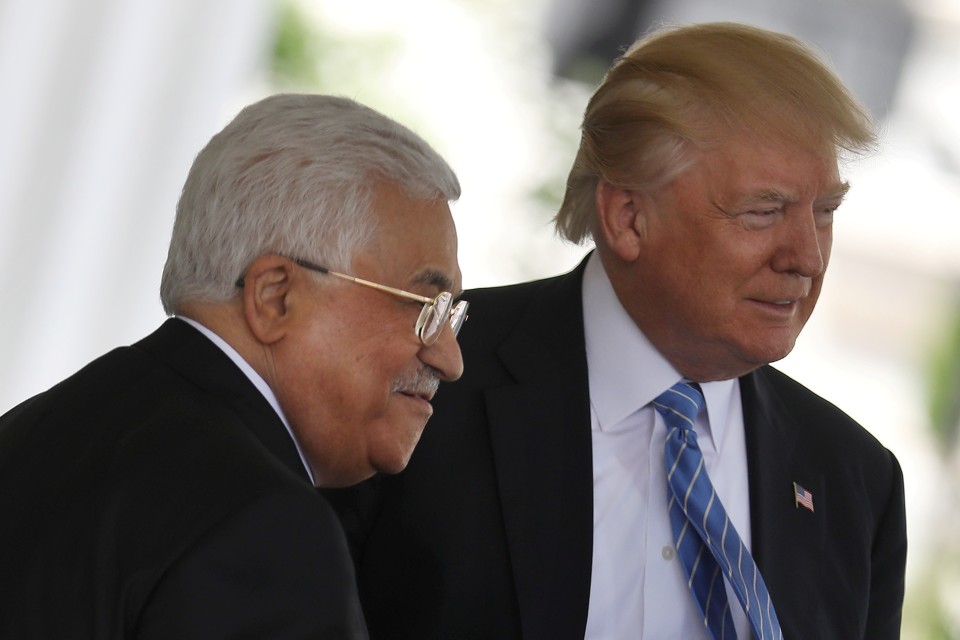By Hani Barghouthi
Presidents Mahmoud Abbas and Donald Trump met last week in the White House in a significant US visit for Abbas. You can read a full transcript of their remarks after the meeting on Haaretz. In the remarks, Trump displays much confidence in his ability to be the US president who achieves peace between Palestine and “Israel” (without once mentioning that that peace would involve Palestinian statehood), and Abbas is full of compliments for Trump.
In the Atlantic article, Hussein Ibish analyses this meeting and whether it signals prospects for the “peace process”. He also focuses on what the meeting means for Abbas and his political power. It’s a much-needed lifeline for the Palestinian president, Ibish argues, following a series of political challenges, including the hunger strike by Palestinian prisoners, led by Marwan Barghouthi – “the most popular Palestinian political figure”.
“[Abbas] joins those pro-American Arab leaders, almost all his regional allies, such as the Gulf Arab monarchs and Egyptian President Abdel Fatah al-Sisi, as one of Washington’s “traditional Middle Eastern partners” who were estranged under Obama but who are now being warmly embraced by Trump.”
Following the release of a publication by Jewish Voices for Peace titled On Antisemitism: Solidarity and the Struggle for Justice, Jacobin’s Jason Farbman spoke with JVP’s Rebecca Vilkomerson and Rabbi Brant Rosen. In this interview, they discuss the definition of antisemitism and how it’s being abused by “Israel”, the USA, and Europe in their quest to stifle any criticism of the Occupation. The interview, and the development of JVP, showcases a growing opposition to “Israel” in the West, and is an important read for Arabs and Westerners alike.
Vilkomerson says that describing criticisms of Israel as antisemitic “flattens the Jewish experience. It discounts the historically constant Jewish strains of anti-Zionism — or non-Zionism, or post-Zionism, whatever you want to call it — that have always existed since Zionism was created. It ignores the vastly different experiences depending if you are an Ashkenazi (from Europe) Jew or a Mizrachi/Sephardi Jew, or Ethiopian Jew. When you’re talking about any sort of bigotry, part of the definition is the idea that you can make one overarching generalization about that people.”
Radical Islamism has been at the forefront of the French presidential elections. A few days before the second round, The Intercept published a piece by Dorothée Thiénot in which she explores the relatively new concept of “deradicalisation” that was adopted in France after the 2015 Charlie Hebdo attacks. She interviews several figures with vastly different views on the concept of deradicalisation and what France’s attitude and action towards radical Islamism should be, but the general theme that emerges is that France does not seem to know which approach might work. Whoever is elected today will have to figure out how to deal with this, and however they choose to manoeuvre this issue will be closely watched globally.
“We rejected their demands and we’re paying for it today. A part of those who are indoctrinated by Daesh are the result of this lack of recognition, this lack of cosmopolitan awareness by the government”.
And finally, Nesrine Malik offers a much-needed critique of representations of Muslim identity in the west today. She uses an “Identity Matrix” that combines a “visibility scale” with a “privilege scale” to determine how likely it is that Muslim will be discriminated against, and argues that the prujdices and and attacks against Muslims have fuelled a counter push where only “positive, stylized, aspirational, attractive, overly feminized, bourgeoisie Islam has flooded the zone”.
“Liberal politicians and media are also keen to oppose right-wing views of Muslims, and the consumerist market in general sees Muslims as a new iteration of “behind the veil” tropes or Westernized “bad asses” (see Nike’s recent commercial starring Muslim women defying disapprovers as they sport their way to freedom). The commodification of Muslim identity is emerging as the most powerful influence in the process of identity formation. The interaction between the free market and the very narrow prism through which dominant establishment thinking is filtered has begun to treat Muslims like any other product.”




